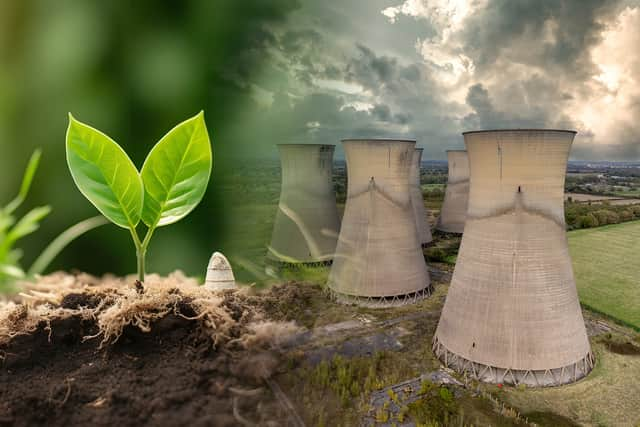Nuclear power: Is government's rapid nuclear expansion plan our fossil fuel emissions panacea?
and live on Freeview channel 276
Nuclear power is already a divisive issue among British environmentalists, with some concerned its inherent risks outweigh its potential to generate power without creating carbon emissions.
Now Energy Security Secretary Grant Shapps is set to reveal how government's newly-formed body Great British Nuclear (GBN) will drive a rapid expansion of new nuclear power plants in the UK - at what the government describes as an unprecedented scale and pace.
Advertisement
Hide AdAdvertisement
Hide AdThe plans will involve an international competition, with companies from across the globe vying for funding to develop new, smaller-scale nuclear reactors capable of being built in factories and deployed nationwide.
The move is set to reduce dependence on volatile fossil fuel imports, create more affordable power, and grow the economy - while also helping the UK get closer to its net zero carbon emission goals.
But is nuclear power really the key to powering Britain while slashing its emissions? Here is everything you need to know:
Is nuclear power the 'green' answer to fossil fuels?
Nuclear energy is not a renewable energy source, like water for hydroelectric dams, wind for wind turbines, or the sun for solar panels, experts at the Natural History Museum say.
Advertisement
Hide AdAdvertisement
Hide AdNuclear power is generated by using radioactive fuel sources like uranium - which have to be specially mined and are a finite resource. These react together in a process called nuclear fission, which creates a lot of heat, and boils water. The steam from this water turns large turbines, which generate and store large amounts of electricity.


But when producing nuclear energy no greenhouse gases are released, meaning it is a low-carbon option compared to burning fossil fuels like gas or coal - which are substantial drivers of climate change. While emissions are created during mining and transport processes, the National Grid says that the “lifecycle emissions” - emissions created in every stage of the production process - are also significantly lower than in fossil fuel-based generation, the Guardian reports.
Some researchers argue nuclear power essential for helping countries like the UK reach their 'net zero' targets, while still producing all of the energy its population needs, because there is not yet enough renewable energy capacity otherwise. Renewable power is also intermittent, the Natural History Museum added - for example, wind turbines don't produce power when the wind is not blowing.
Does it pose any environmental risks?
Nuclear power is not without inherent risk, even without the threat of facilities being targeted in times of conflict as is the case for Ukraine's Zaporizhzhia plant, or falling victim to natural disasters - like Japan's 2011 Fukushima disaster.
Advertisement
Hide AdAdvertisement
Hide AdOne environmental issue is that the power-generating process creates radioactive waste products - which can remain dangerous to human health for potentially hundreds of years. This can also include the water used for cooling.
This means that these products have to be very carefully stored and exposed of, or they can risk causing substantial harm to both people and the environment.
Decommissioning an old nuclear power plant comes with similar issues, and the process can take years to do safely. With all but one of the UK's current plants set to be decommissioned by 2028, planning around this process is a notable concern to many in the anti-nuclear camp,
How does it compare to the risks of burning fossil fuels for energy?
Like much of the rest of the world, Britain has been warned it needs to drastically cut its greenhouse gas emissions to try and curb average global temperature increases.
Advertisement
Hide AdAdvertisement
Hide AdClimate change is driving the average global temperature up, with last week and last month both breaking records for hottest on record.
On Monday (17 July), the Met Office warned that if a high emissions scenario continues, by 2070 the UK’s average hottest summer day could be between four and seven degrees warmer than a 1990s baseline, with summers in general between one and six degrees warmer. Across Europe, there were 61,000 extreme heat-related deaths last year alone.
A recent University of Oxford study revealed the UK is nearly at the top of the chart when it comes to countries which will have to make the most radical changes to keep its homes cool enough for those inside to be comfortable - with the most buildings designed to keep heat in during the cold winter.
The scientists also warned of a “vicious cycle” developing, where people burned more fossil fuels to provide energy for cooling, which then heated the climate further.
Comment Guidelines
National World encourages reader discussion on our stories. User feedback, insights and back-and-forth exchanges add a rich layer of context to reporting. Please review our Community Guidelines before commenting.
